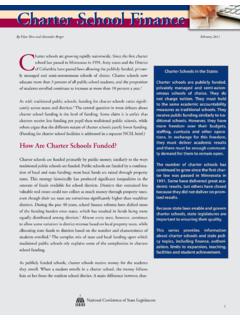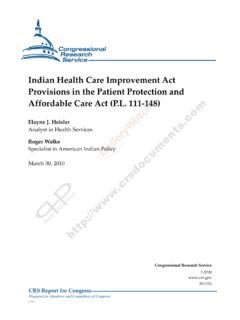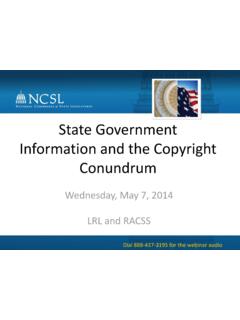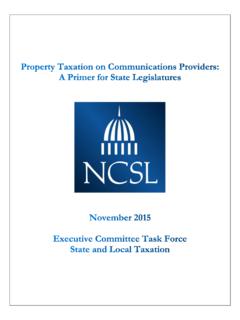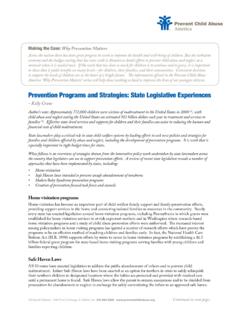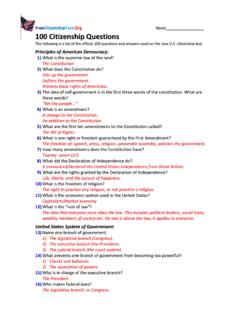Transcription of State Balanced Budget Provisions 2010 updated …
1 national conference of State legislatures NCSL FISCAL BRIEF: STAT E Balanced Budget Provisions October 2010 Balancing the Budget is widely considered to be the foundation of State fiscal practices. Keeping a Budget Balanced in times of fiscal stress, however, can be an overwhelming challenge for policymakers. This report reviews the meaning of a State Balanced Budget and identifies the statutory and constitutional Provisions that various authorities State legislative fiscal officers, executive Budget officers and academics identify as the requirements that apply. Besides being a major concern in State policy and politics, State Balanced budgets are also a subject for academic analysis. Some of the findings of academic study are discussed here, since they demonstrate how difficult it is to find consensus on what a State s Balanced Budget requirements are. For State policymakers, the requirement of a Balanced Budget largely refers to the operating Budget . In most states that is the general fund Budget , which is the subject of annual or biennial appropriations.
2 The general fund is where most State tax collections are deposited and from where most appropriations are made. A few states also have an education fund that receives tax revenues, is appropriated and is subject to balance requirements, like the general fund. Less attention (if any) is given to the question of whether a State s entire Budget is in balance. Grants and reimbursements from the federal government make up most of a State s non-general fund. The question of balancing these revenues with expenditures does not arise since states can spend only as much as they receive. State non-general fund expenditures from State sources tend to be from revenues legally designated (or earmarked ) for specific purposes and controlled by their availability. Bond finance for capital projects, the purpose of which is borrowing against future revenues, is generally not considered by policymakers to fall within any constraints of a Balanced Budget requirement. This report includes: The nature of State Balanced Budget requirements What is meant by a Balanced Budget State compliance with Balanced Budget requirements Constitutional and statutory citations for State balance Budget requirements State Balanced Budget Provisions 2 national conference of State legislatures So, what does it mean if a State must balance only the operating Budget ?
3 What is meant by a Balanced Budget is not as clear as it may seem intuitively. Even the number of states whose laws require a Balanced Budget can be disputed, depending on the way the requirements are defined. The national conference of State legislatures (NCSL) has traditionally reported that 49 states must balance their budgets, with Vermont being the exception. Other authorities add Wyoming and North Dakota as exceptions, and some authorities in Alaska contend that it does not have an explicit requirement for a Balanced Budget . Two points can be made with certainty, however: Most states have formal Balanced Budget requirements with some degree of stringency, and State political cultures reinforce the requirements. THE NATURE OF State Balanced Budget REQUIREMENTS Some states have strict, explicit Balanced Budget requirements to ensure that expenditures in a fiscal year are within the cash available for that fiscal year. For example, the Oklahoma Constitution requires the periodic allotment of appropriations from a fund be reduced on a pro rata basis if the fund s revenues fall below the forecast.
4 In other states , the requirement comes from a constitutional limitation on State indebtedness or some other budgetary provision. Virginia, for example, has a constitutional requirement that the governor keep spending within revenues, but lacks a binding enforcement mechanism. Constitutional Provisions in other states , such as Michigan, allow unavoidable deficits to be resolved in the next fiscal year, without defining unavoidable. 1 In some states that lack explicit language requiring a Balanced Budget , a generally observed practice of doing so is based on a limitation on State debt, interpretation of other statutes, or traditional practice. State Balanced Budget requirements can be categorized as consisting of one or more of the following: The governor s proposed Budget must be Balanced ; The enacted Budget must be Balanced ; No deficit can be carried forward from one fiscal period into the next. The national Association of State Budget Officers (NASBO) conducted the most recent survey of such requirements in 2008.
5 Its findings appear in Table 1. 1. Arnold Rich, Fiscal Year Deficits: A Review of State Deficits and Their Legal Consequences (Senate Fiscal Agency, Michigan State Senate, Lansing, Mich., December 1991) . State Balanced Budget Provisions 3 national conference of State legislatures Table 1. Balanced Budget Requirements State governor Must Submit Balanced Budget Legislature Must Pass Balanced Budget Cannot Carry Over Deficit Alabama C, SSXA laska SSXA rizona C, SC, S--Arkansas SSXC alifornia CCXC olorado CCXC onnecticut SC, S--Delaware C, SC, SXFlorida C, SC, SXGeorgia CCXH awaii C.
6 S--XIdaho --CXIllinois CC--Indiana ----XIowa C, SSXK ansas SC, SXKentucky C, SC, SXLouisiana C, SC, SXMaine C, SCXM aryland CC--Massachusetts C, SC, S--Michigan C, SC--Minnesota C, SSXM ississippi SSXM issouri C, S--XMontana SCXN ebraska CSXN evada SCXNew Hampshire S--XNew Jersey CC--New Mexico CCXNew York C----North Carolina C, SSXN orth Dakota CCXOhio CCXO klahoma SCXO regon CCXP ennsylvania C, S----Rhode Island CCXS outh Carolina CCXS outh Dakota CCXT ennessee CCXT exas --C.
7 S--Utah CC, SXVermont ------Virginia ----XWashington S--XWest Virginia --C--Wisconsin CC--Wyoming ----XPuerto Rico CCXT otals 44 41 38 Key: C Constitutional; S Statutory Note: Data for Puerto Rico are taken from a NASBO survey conducted in 1995. Sources: national Association of State Budget Officers, 2008 State Balanced Budget Provisions 4 national conference of State legislatures Table 1 represents the understanding of State executive branch Budget officers of their states requirements.
8 It is used as a foundation for this report s discussion because it is the most recently compiled 50- State information. Not everyone would agree with its listings. Yilan Hou and Daniel Smith of the University of Georgia compiled substantially different lists of State Balanced Budget Provisions in work they published in 2006, based on their reading of State statutes and constitutional Appendix 1 of this report consists of the sources for State Balanced Budget Provisions that State legislative fiscal staff provided NCSL in 1996, which do not entirely agree with the Budget officers or Hou and Smith. The General Accounting Office (GAO; now known as the Government Accountability Office) also came to different conclusions in 1993. 3 Different readings of the law, the extent to which people s understanding is influenced by State judicial decisions (which no one appears to have compiled), and State practice can lead to different conclusions about the nature of the laws and their applicability.
9 For example, Table 1 reports that 43 states and Puerto Rico require that the Budget a governor recommends must be in balance. GAO concurred in its 1993 report. Hou and Smith, however, reported that governors in only 33 states must submit a Balanced The requirement of a proposed Balanced Budget is generally regarded as the weakest of the three types of requirements. A tougher requirement is that the Budget enacted by the legislature has to be Balanced . Where does this apply? Once again, authorities differ. GAO reported in 1993 that 36 states have such a In 2006, Hou and Smith reported that 45 states have And in 2008, NASBO reported, as seen in Table 1, that 41 states have this requirement in the constitution, statutes or People even differ over the requirement in a given State . For example, NASBO found neither a constitutional nor statutory requirement for Hawaii, but Hou and Smith found a constitutional provision. Hawaii legislative fiscal staff reported that both exist.
10 Budget officers and legislative fiscal staff in Maine and Tennessee reported a constitutional obligation for the legislature to pass a Balanced Budget , but Hou and Smith could not find that requirement in either State s constitution. The General Accounting Office commented that some Balanced Budget requirements are based on interpretations of State constitutions and statutes rather than on an explicit statement that the State must have a Balanced Budget . 8 Reading the constitutional and statutory Provisions cited in the Appendix supports GAO s observation, since a number of them appear to be limitations on debt or 2. Yilan Hou and Daniel L. Smith, A Framework for Understanding State Balanced Budget Requirement Systems: Reexamining Distinctive Features and an Operational Definition, Public Budgeting and Finance Public Budgeting and Finance 26, no. 3 (September 2006), 22-45. 3. General Accounting Office, Balanced Budget Requirements: State Experiences and Implications for the Federal Government (GAO/AFMD-93-58BR, Washington, : GAO, 1995), 15.
